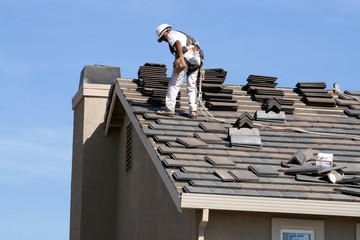Roofing Contractors are professionals who perform roof installation, maintenance, repair, and treatment. Demand for these services has steadily increased over the past five years, thanks to a recovery in the real estate and office building markets. In addition to residential and commercial construction, demand for roofing contract work is expected to increase as the construction industry grows. The following is a breakdown of the industry’s projected employment trends and wage figures through 2022.

Before hiring a roofing contractor:
- Do not forget to ask for references.
- Check whether the company has guarantees or warranties, and ask if the work is covered by workers’ compensation or liability insurance.
- Ask about the contractor’s experience with the type of roof you need. You can also ask for a portfolio of their completed jobs.
If the contractor has an extensive portfolio of roofing projects, that is a good sign. After deciding on a contractor, discuss the costs with him before signing a contract.
Roofing contractors should be GAF-certified if they are selling GAF products. This will help them get better discounts and loyalty rewards. They may even get discounts on marketing tools and products. In exchange, they must purchase a minimum amount of GAF products. Be sure to read the terms and conditions for any warranty offered. When comparing roofers, it is important to consider the manufacturer’s certifications. A licensed, accredited roofing contractor can provide a warranty covering damage caused by faulty workmanship.
A certified roofing contractor can give you a detailed estimate of the cost of a roof repair or replacement. These contractors must also maintain good working relationships with their customers. A good roofing contractor will keep you informed about any changes and be able to answer your questions and concerns. They will also help you get a good estimate of the labor costs. A roofer can also help you with insulating the roof of your building.
Choosing the right roofing contractor is crucial to your home’s safety. A qualified roofing contractor can install roofing systems and repair roof problems safely. An experienced contractor will be able to set up equipment safely, communicate with a supervisor about the job’s progress, and transport materials safely to and from the job site. They should be able to carry heavy materials and operate powered hand tools safely. In addition, they should have the necessary experience and knowledge of the different types of roofing systems.
Regardless of the size of your project, a reputable roofing contractor can handle any roofing project. From repairing roofs with leaks to installing replacement roofs, roofing contractors are there for you. They offer 24-hour emergency services and provide expert recommendations. These companies also install vinyl, metal, and asphalt roofing. They have been in business for more than 20 years and have completed over 8,000 projects.
Roofing Contractors can also install skylights. If you own a historic house, a specialist roofer may be able to accommodate intricate roofs. Historic buildings require historically accurate roofing materials, so an expert roofing contractor may partner with a mason to protect historic chimneys. These contractors should also be registered with the state. You can also look for a contractor with a long list of satisfied clients. They are a good choice if you choose a roofing contractor with extensive references.
A professional roofing contractor spends considerable time sourcing quality roofing materials. Their recommendation may include a particular brand of material. The reason for this choice may vary depending on your location, your color preferences, and the experience of their crew. However, your roofing contractor should be able to explain which type of shingle is best for your home. In addition, they should be able to offer a warranty on the roofing materials they have installed.
Some companies have been in business for 38 years and claim to go the extra mile for their customers. They provide high-quality roofing services in a timely manner and have a number of services that extend beyond roofing. For instance, they specialize in roof repair and replacement as well as siding, windows, and doors.
